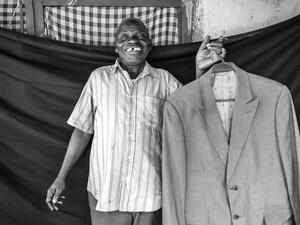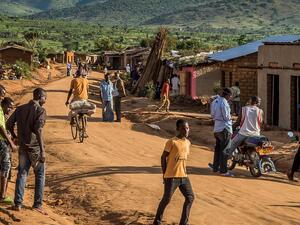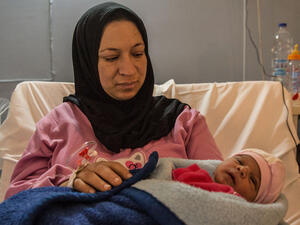More than 100,000 Libyans flee fighting over past month
More than 100,000 Libyans flee fighting over past month

A group of Tawerghan men displaced after the fighting in Libya in 2011. UNHCR is concerned about the situation of some 2,500 Tawerghans who fled their camp in Benghazi in mid-October to escape fighting that has forced more than 100,000 to flee their homes in the past month.
GENEVA, November 14 (UNHCR) - The UN refugee agency on Friday reported that intense fighting among rival armed groups in western, eastern and south-eastern Libya has forced more than 100,000 people to flee their homes in the past month.
The stepped up conflict is centred on the towns of Benghazi and Derna in the east, in the country's south-east at Ubari and in the west at Kikla. The insecurity is hampering humanitarian operations.
Aid agencies are still trying to calculate the scale of internal displacement. "We have confirmed reports from our NGO partners of 56,500 people having fled Benghazi in the past few weeks," UNHCR spokesman Adrian Edwards said in Geneva, adding that they included some 2,500 already internally displaced people originating from the deserted northern town of Tawergha.
Still more people have fled from the eastern coastal town of Derna, but UNHCR is unable to confirm how many. Local crisis committees in the south-east confirm some 11,280 people have fled fighting in Ubari, while in the west civilian groups report 38,640 people have been displaced by fighting in Kikla, including many women and children.
"In all, we estimate that more than 393,420 people have become internally displaced in Libya since violence escalated in May. They are scattered across 35 towns and cities and are in dire need of shelter, health care, food, water and other basic commodities," Edwards said.
The fighting has been fiercest in Benghazi, from where people have fled to the nearby towns of Al Marj, Ajdabiya, Al Bayda, and Misrata. These towns are now reaching the limits of what they can to help the displaced.
Al Marj has had to close its schools to accommodate people unable to stay with host families. Al Bayda and Tobruk are also straining to house the rising tide of displaced people seeking shelter there (from Derna as well as Benghazi). Schools in Tobruk in the east will also be closed so they can host the displaced people.
Of particular concern to UNHCR is the situation of some 2,500 Tawerghans who fled their camp in Benghazi in mid-October, and are now staying in parks, schools and parking lots in Ajdabiya and neighbouring towns, with only thin plastic sheets and some tents for cover.
Winds and rains over the coming winter months will be hardest on women, children and the elderly who lack warm clothes, heaters and insulated tents and shelters.
Cross-border aid convoys are the only way to get in supplies. While UNHCR and its partners have delivered aid to some 19,000 displaced people through cross-border convoys in August and September, the refugee agency faces constraints with funding and access.
UNHCR is also concerned about the welfare of some 14,000 of the 37,000 registered refugees and asylum-seekers (almost half from Syria) in Libya stranded in conflict zones or unable to provide food for themselves and their families.
During times of conflict, refugees, asylum-seekers and migrants are often viewed with suspicion and suffer from animosity towards all foreigners. With no alternatives, many have departed on smugglers' boats to Europe. So far this year, more than 156,000 have arrived in Italy - more than 85 per cent departing from Libya.
UNHCR released on Thursday its latest position paper on returns to Libya, which calls on all countries to allow civilians fleeing Libya access to their territories, and urges all states to suspend forcible returns to Libya until the security and human rights situation has improved considerably. The paper is available at http://www.refworld.org/docid/54646a494.html.








